How to Speak Spanish in 4 Days
While you can't master Spanish or reach fluency in a few days, you absolutely can start to speak Spanish in this time. I famously aim to speak a new language on day one (or even hour one), but experience in doing it so often has given me a big edge. Passing the speaking barrier is one of the most important steps in your entire language learning journey, so the sooner you conquer it, the better.
That's why I love the blow-by-blow details of this intensive Spanish coaching effort that Aran gave his student Martyn. Intensive learning like this is painful, but it by far the best way to push yourself and make true progress.
Let's hear their story and what a difference four days made!
I’d been teaching Martyn how to speak Spanish for three days, and I thought I was about to lose him.
He was brutally tired, yawning every few seconds, and obviously not having a good time. He looked as though he might kick me out.
He didn’t, though. He pushed through the pain, and that turned out to be a good thing, because something rather surprising was just about to happen.
If he'd left, he'd have missed all the fun.
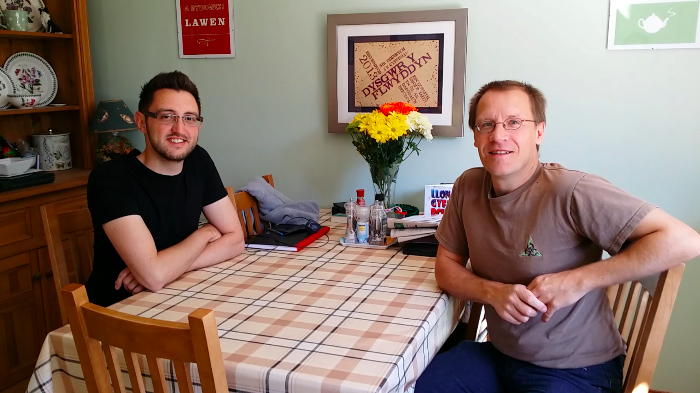
Martyn’s journey had started a week before, when I arrived at his house in Llannor, near Pwllheli in the north of Wales, just after 9am. He already looked slightly nervous, and with good reason.
Martyn is a tutor of the minority language Welsh, which is spoken in Wales, UK by around 500,000 people. I met Martyn at a language conference, where I had given a presentation on intensive language learning. My presentation sparked Martyn’s interest, and he asked me if I’d teach him how to speak Spanish from scratch. This was perfect, as I wanted to test my intensive learning methods on a willing victim.
The Plan to Create a Spanish Speaker in Four Days
We'd agreed a structure I wanted to test. We were going to do two intensive days in a row, then give Martyn five days off for a little consolidation (and to avoid tears), and then follow up with another two intensive days. At the end of it, he'd try to speak some Spanish on a Skype call with Gaby, an Argentinean opera singer and polyglot living in the north of Italy.
As you'll know if you've done serious intensive work, that's a reasonably tough schedule.
But the schedule was a piece of cake compared to the method…
How to Speak Spanish: The Intensive Learning Method
Martyn was going to be working through material I'd put together with help from Gaby that was designed to give Spanish learners a very difficult time.
Our materials often remind people of the work of Michel Thomas. The Michel Thomas method involves CDs where Michel gives a prompt in English, followed by a pause for the listener to translate the prompt into the target language. The correct answer is then given.
The Spanish materials Gaby and I created for Martyn were like Michel Thomas on steroids, in that they were much more difficult than the traditional Michel Thomas approach. In fact, “steroids” is an understatement. Our materials were more like Michel Thomas on a shipping-container-full of dangerously experimental Class A drugs, on a stormy night, blindfolded, with police sirens somewhere in the background.
All Martyn was going to do, all day long, was hear prompts in English, have a few seconds to translate them into spoken Spanish, and then hear them twice in Spanish (first from our female voice, Rosa, and then from Gaby, the opera singer). Again and again and again. Mercilessly. The prompts were going to get longer and more complicated, the pause button was banned, and he wasn't allowed to repeat any sessions at all – no matter how difficult he found them.
No, I wasn't joking about the tears.
Speak Spanish in Four Days: Day One
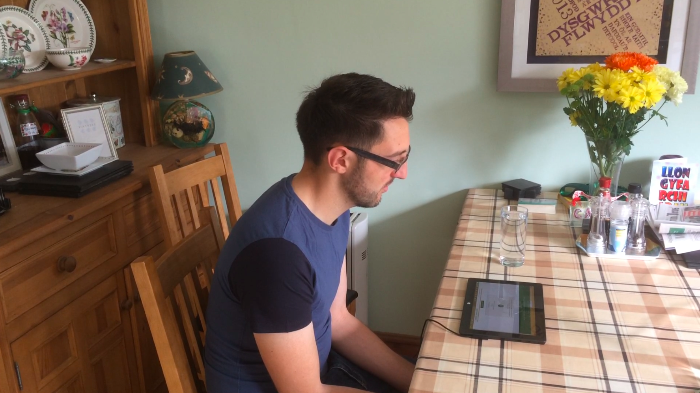
It was just after 9am. I'd dropped the kids off at school, and there was Martyn – looking nervous. He wasn't expecting to learn much Spanish in four days, he said. He'd be happy if he could say a few simple Spanish phrases ‘in a fairly robotic manner' by the time we finished.
I felt confident that we could go further than that.
My confidence lasted until Martyn needed some painkiller tablets after the first 30 minute session.
He was doing well, though, apart from turning to drugs so early in the process. He got through four ‘half-hour' sessions of English to Spanish drilling that morning (despite the fact that most of them were closer to 40 minutes than 30), and he was often saying the Spanish correctly ahead of Rosa. He hadn't got a grip on ‘estoy tratando' (I’m trying) or ‘estaba tratando' (I was trying) (no, we don't do things in anything like the usual order), but he wasn't letting that dampen his spirit.
Things changed after lunch, though.
Maybe Martyn should have taken on a bit more protein, or a decent kick of caffeine. All he had was a ham sandwich and a banana. Bananas may be okay for tennis players, but language learning is serious work! Raw steak and guarana might have been a better choice. Or maybe it was my fault – maybe the work was so hard, his brain was going to fall to pieces whatever the hell he ate.
Most people get miserable and give up when they start making mistakes.
Martyn didn't give up..
The Turning Point in Martyn's Spanish
It was starting to feel as though we'd got ourselves caught up in a Rocky film, and couldn't get past the point where Sylvester Stallone was taking enormous (and unrealistic) punishment. Smack! Punch! Headbutt! Elbow in the ear!
As he made more mistakes, some interesting patterns appeared. Martyn would swap consonants inside a word – ‘como se dice' (how do you say) would become ‘como de side'. He was doing the same with vowels – ‘quería' (I wanted) might turn into ‘quiara', for example. He was also getting some individual consonant shifts happening – he’d say a ‘d’ instead of a ‘t’ (or the other way round), or swap a ‘p’ for a ‘b’, that sort of stuff.
If you've worked in the field of language learning, my guess is that you're hearing a little ‘dyslexia' bell ringing round about now. I certainly was – and I was increasingly aware that Martyn's short-term memory wasn't very strong (which is another possible marker of dyslexia).
Martyn was swapping consonants and vowels all over the place. He was getting fewer and fewer sentences out before Rosa. His short-term memory was making it hard for him. And he was starting to look a little pale!
We decided to call it day at 5:15pm. I didn't want blood on my hands.
It wasn't looking promising…
Martyn had finished seven Spanish sessions, and had worked with enormous determination – but I was starting to wonder if the spaced repetition built into the sessions could possibly work in the face of so many difficulties. If he wasn't saying the second half of most of the sentences, how could they count as spaced repetition?
Just before I left, though, Martyn said something that gave me hope.
‘It feels odd,' he told me. ‘It's as though there are lots of new things sloshing around in my head.'
“Aha!” I thought…
Speak Spanish in Four Days: Day Two
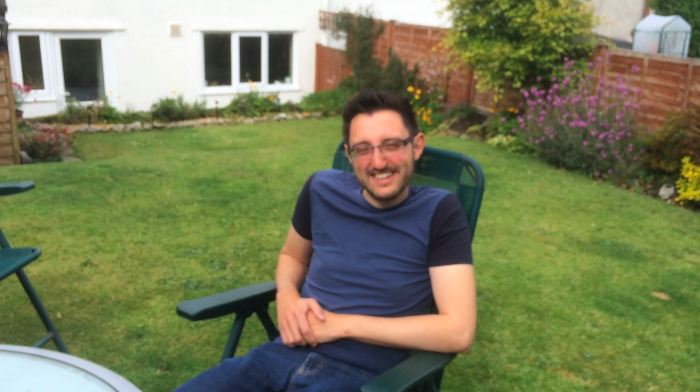
The next day was a lovely, sunny day. A good day for some hard work, I told myself, as I drove slowly down the countryside lanes to Martyn's neat and tidy home. When I say “neat and tidy”, I mean absolutely perfect. You could use Martyn’s home in an IKEA TV commercial.
‘I do like to keep it tidy,' he said, as though he was admitting something. It wouldn’t last long if my 6 year old and 4 year old came to visit, I thought. ‘I like structure,' he added. ‘I like to be in control, and to make sure I know what I'm doing.'
I tried not to look as worried as I felt.
I was glad he hadn't told me about his love of control the day before. The kind of intensity we were using needs people who don't mind making mistakes. Lots and lots (and lots) of mistakes.
Martyn had made a lot of mistakes on day one. He’d been swapping consonants, he was forgetting the ends of phrases, and he was having a tough time with his short-term memory. Now it turned out that he didn't like making mistakes, either. It wasn’t going to be easy.
We threw ourselves back into the hard work with little cries of delight. [Well – they were very little, and maybe there wasn't all that much delight in them, now I think about it. Perhaps they were just quiet sobs.]
And, hallelujah! Martyn had another treat in store for me. His Welsh was starting to interrupt his Spanish…
‘Decir' would shapeshift into ‘dweud' (to say), ‘pero' would hiccup into ‘ond' (but). It seemed that Martyn's Welsh didn’t like the idea of him learning another new language. But Martyn, ladies and gentlemen, is a fighter.
I was tempted to start using the pause button to help him, but he was jumping up at the end of a session, grabbing a glass of water, saying ‘agua!' cheerfully, and then sitting straight back down ready to carry on. In the course of the day, he got through another eight sessions, for a total of 15 half-hour sessions finished in the the first two days.
It didn't matter that by now he wasn't managing to say any of the longer sentences before Rosa – I can remember the look of surprise on his face when he managed to say one long sentence correctly in the middle of the afternoon. It didn't matter that ‘no entendí como hacerlo' (I don’t understand how to do it) became ‘no centindé' followed by a sigh and a look of despair. It didn't even matter, apparently, that he was starting to hit his head in frustration on a regular basis. It didn't matter that in session 13, Rosa started speaking so quickly I got the impression she was late for a vital appointment.
Martyn just kept going. Terminator style.
I brought proceedings to a halt at 5:00pm. Martyn, as far as I could see, would have carried on until his brain fainted in self-defence, but I needed to get home and help myself to a very strong drink or three (whatever the kids would say). ‘Mam, Tada's drinking your Scotch again! It's not even tea-time!'
Before I left, I gave Martyn the rules of the game for the next 5 days.
No revision. No extra sessions. Fifteen minutes of listening exercises each day, and nothing else.
Time to forget the pain, and let some consolidation happen.
Speak Spanish in Four Days: Day Three
When Martyn returned for his third day of Spanish, I was expecting him to be looking cheerful. “He'll have enjoyed the break,” I thought. I hoped he’d have bits of Spanish playing hide-and-seek in his head, and he'd be looking forward to starting again.
Instead, he opened the door with bags under his eyes, yawning, and not looking very excited to be alive. He told me he'd had a tough night. He was painfully short on sleep, and we were managing to tick even more boxes in what was rapidly becoming a list of ‘Not Perfect Ways To Learn Spanish'.
It felt like the right time to tell him that today, we would only be talking in Spanish. We hadn’t kept to Benny's Speak from Day One mantra – Martyn had spent his first two days saying things in Spanish, true, but only after a prompt in English. Today was going to be different. No Welsh or English. Just Spanish or deep and beautiful silence.
I thought I might lose Martyn. All the hours of intensive learning were obviously hurting. ‘Acabo de comenzar' (I’d just started) kept turning into ‘abaco de’.
I was grateful that Martyn hadn't read Benny's tips about swearing in Spanish.
Then the phone rang, and Martyn had a 10 minute conversation in Welsh. He came back looking as though he'd been punched. It was surely only a matter of time before he fell over. He was fidgeting in his seat badly by now, as if his body was begging him to stop all this hard work.
We made it to lunch, just about.
Then, as we were about to eat, the magic happened.
A Short Break, And Some Unexpected Magic
Martyn got up, and began to take food out of his kitchen cupboards.
‘Key? Ust? Ust key? Na. Quiere usted? Quiere usted algo? Quiere usted algo comer?' (Do you want something eat?).
I might have looked a little over-excited.
‘Sí! Sí! Quiero algo de comer!' (Yes! Yes! I want something to eat!).
‘Muy bien (very well),' he answered calmly, and there it was: his first communication in Spanish.
It was, of course, just the beginning.
Martyn was still exhausted, but you could see the excitement bubbling up to the surface. He started to reach for more to say – more little moments of communication – and he was understanding most of what I was saying back to him. It encouraged both of us. A few simple moments of real communication – speaking real Spanish – and suddenly all the worry that the method wouldn't work disappeared.
The afternoon went past in a blur.
Martyn was still making mistakes. Mountains of them. At a guess, he was getting about 10% of the target phrases right before he heard Rosa. But it didn't matter any more. We could both see that he was genuinely learning.
He was starting to fine-tune, as well. ‘Usted habla lo' became ‘usted lo habla' (you speak it) without any clues from me, and then ‘Puede usted lo decir?' switched itself back to ‘Puede usted decirlo?' (Can you say it?). I kept wanting to high-five him.
I'd decided, more or less at random, that the first 25 sessions we’d built were our ‘Level One'. Martyn had session 22 finished by half-past three – and despite his new enthusiasm, he was yawning too much to answer at least half the time.
We decided that we'd earned an early finish – partly because there was something worrying me. I wanted Martyn to have a good night's sleep.
In less than 24 hours, Gaby was going to call him on Skype, and speak Spanish at him. And we were going to record it. Martyn obviously felt a little stressed about this, and I can't say I was calm. I imagined finishing this experiment with a video showing Martyn failing to remember any Spanish. Pressure can make anyone crack, and it’s worse for a brand new learner.
But we were committed…
And as I've said before, Martyn's not the kind of guy to back away from a challenge.
Speak Spanish in Four Days: Day Four
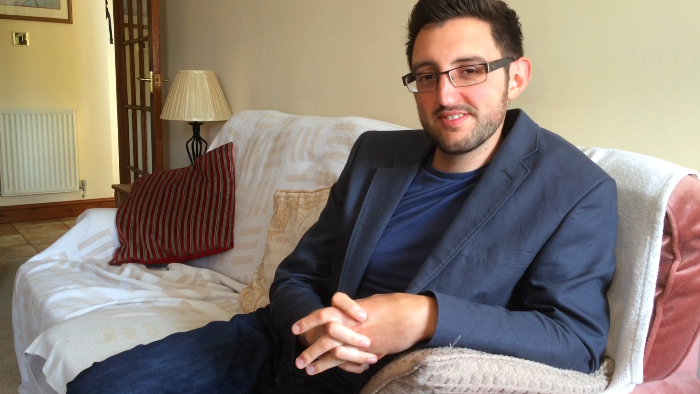
I used to teach languages in a British high school, and I can still remember the sense of helpless worry I'd get when my students were going into exams. It's a horrible feeling. You want to freeze time so that you can give them a month or two of last minute reminders. But you worry that if you throw any extra details at them, it'll push the other stuff out of their brains.
This feeling came back to me in unpleasant detail as I drove to Martyn's house on the morning of Day Four.
I'd emailed Gaby asking him to use questions that Martyn had covered in Level One. I know how easily fluent speakers can start talking about things that a learner doesn’t understand! Martyn and I decided that we'd just finish Level One by doing the last three sessions, and we wouldn’t move onto Level Two.
We jumped straight back into the ‘Only Spanish' rule, and Martyn was communicating more and more.
By 1:00pm we’d finished three sessions, and Martyn was consistently speaking in groups of five or six words together. This would have been impossible on Day Two. Even on the particularly difficult last session, which revises everything we'd done in the whole of Level One, he was doing better than on Day Three.
It was promising, but I was still worried that Martyn would freeze in front of the camera.
We decided to take the last couple of hours as a chance to relax on the sofas in his living room. We played around with possible questions, and tried out different answers. Martyn was starting to achieve real communication in Spanish – talking about real things, about the process he'd been going through, about what he wanted to do. It felt like much more than you'd expect from a standard beginner who'd only be learning how to speak Spanish for four days.
I was getting more and more optimistic, but I couldn't stop worrying that the camera would make him freeze.
There's a moment when something you're worrying about becomes inevitable, and time suddenly accelerates. It's like the moment on a roller-coaster, at the top of the climb, when your fear gives way to excitement, and everything becomes a blur.
It was like that when we heard Skype ringing.
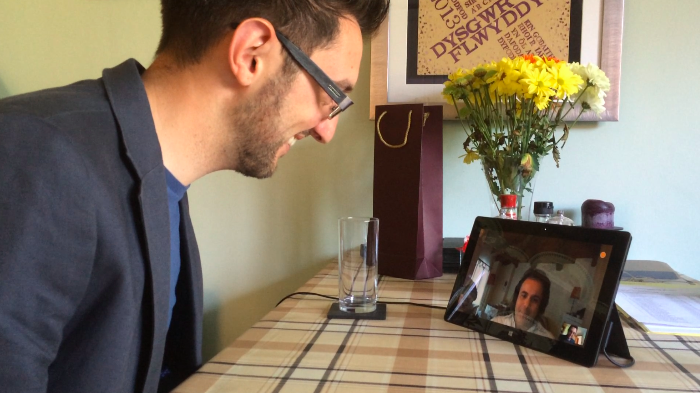
There was Gaby, appearing on the iPad like the friendliest great white shark you ever met.
Ready… ready… ready! I pressed play on the camera, and suddenly there was Gaby throwing Spanish words at Martyn. I knew for a fact Martyn had never heard these words in his life. It's all going to fall to pieces! But no… wait… what's this?
Martyn's answering him! Martyn's heard something in all those words which makes some sense for him! And he's talking! He's speaking Spanish! He's saying whole sentences in Spanish!
What the…? He's just said something in Spanish I have never heard him say before!
Martyn does not freeze in front of the camera. In fact, the camera seems to inspire him. He’s putting words together in ways he hasn't tried before . That’s the final ingredient that turns speaking a new language into a magical experience.
I thought that I would record 10 minutes or so of Martyn speaking, and choose the best two or three minutes. That didn’t happen. I only recorded the first 3 minutes, and left it at that. By the time they'd finished speaking, Gaby and Martyn had arranged to meet up and have a Welsh/Spanish intercambio (language exchange) in the Welsh National Eisteddfod in August. To be fair, by that point the Skype conversation had become something of a Welsh/Spanish intercambio itself. When Gaby switched to speaking Welsh, Martyn said he'd never in his life been so relieved to hear a language he really understood!
Here's the video of Martyn speaking Spanish with Gaby:
https://www.youtube.com/watch?v=CdaLd5ytTAQ
Lessons Learned from Four Days of Intensive Spanish
We learned a huge amount from our experience:
- Four days is enough to go a long way beyond rote-learning, if you focus on communication.
- Making an incredible amount of mistakes is one of the most valuable skills any learner can have.
- If you're willing to keep on making mistakes, you gradually acquire new words, as if by magic. You can get a word wrong 10 times, and then discover it's become easy on the 11th attempt.
- Running out of time and accepting it means you learn faster than if you use the pause button all the time.
- Five days of consolidation might just help make some magic happen.
About the Author: Aran was brought up in Wales, England, Germany, Portugal, Sri Lanka and Malaysia, and worked in Zimbabwe and Dubai until he realised he wasn't very fond of sand. He tweets @aranjones and discusses intensive learning in a Facebook group.

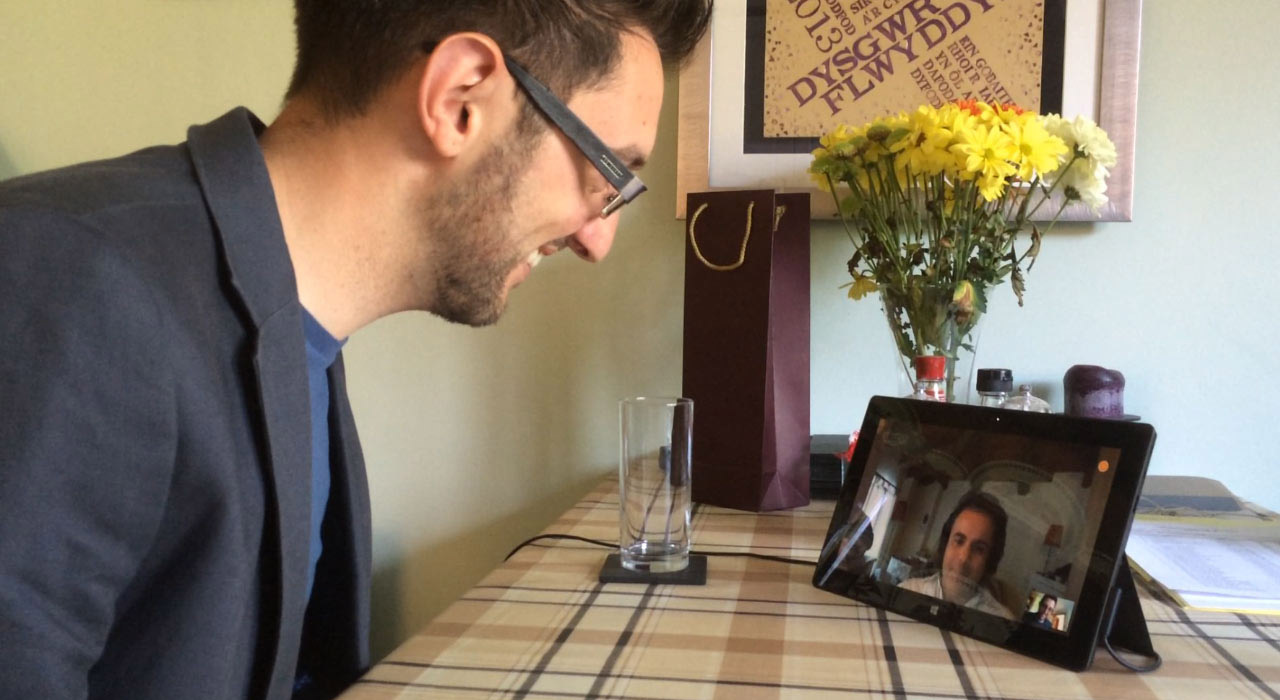

Social